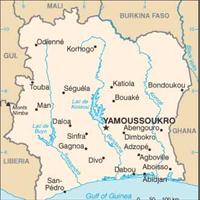COTE D'IVOIRE: Yellow fever epidemic feared as vaccinations start

The Ivorian Ministry of Health has confirmed 19 people have been infected with yellow fever since May, while the World Health Organisation (WHO) warns Cote d’Ivoire is at an “elevated” risk of yellow fever epidemics.
“Since the beginning of May, Abidjan has been threatened with a yellow fever epidemic,” confirmed Felix Bledi Touin, a senior health official. “Three cases have been found in the [Abidjan suburbs] Treichville and Cocody. At this stage, 19 cases have been confirmed and 1,500 people have been vaccinated,” he said.
Yellow fever is spread by mosquitoes. Epidemics touch on average 20 percent of people in affected areas, half of whom may die, according to the WHO. There is no cure for people already diagnosed with the fever, but a vaccination can prevent infection.
WHO vaccinated 26,000 people against yellow fever in February 2006 in Bouna, in the east of the country. A vaccination campaign was also conducted in the capital, Abidjan, in 2001.
The Ivorian government and WHO have announced another vaccination campaign for this year targeting almost two million people in Abidjan.
“Despite a large vaccination campaign conducted in 2001, the rate of coverage is still only around 60 percent,” the WHO said in a statement.
The early symptoms of yellow fever are similar to malaria, making it hard to recognise, experts say. After experiencing fevers, sore muscles, and nausea, an infected person may relapse into jaundice, bleeding from the eyes, nose and mouth. Resulting kidney failure can lead to death.
Yellow fever is on the rise again in Africa, although an effective vaccine has been available for 60 years.
 Back and Next - Back and Next
Back and Next - Back and Next See Also - See Also
See Also - See Also